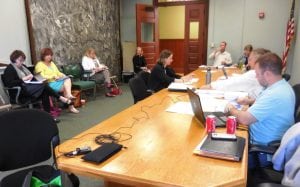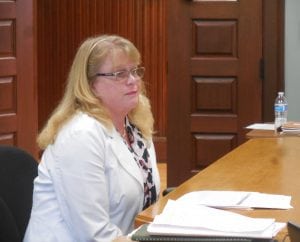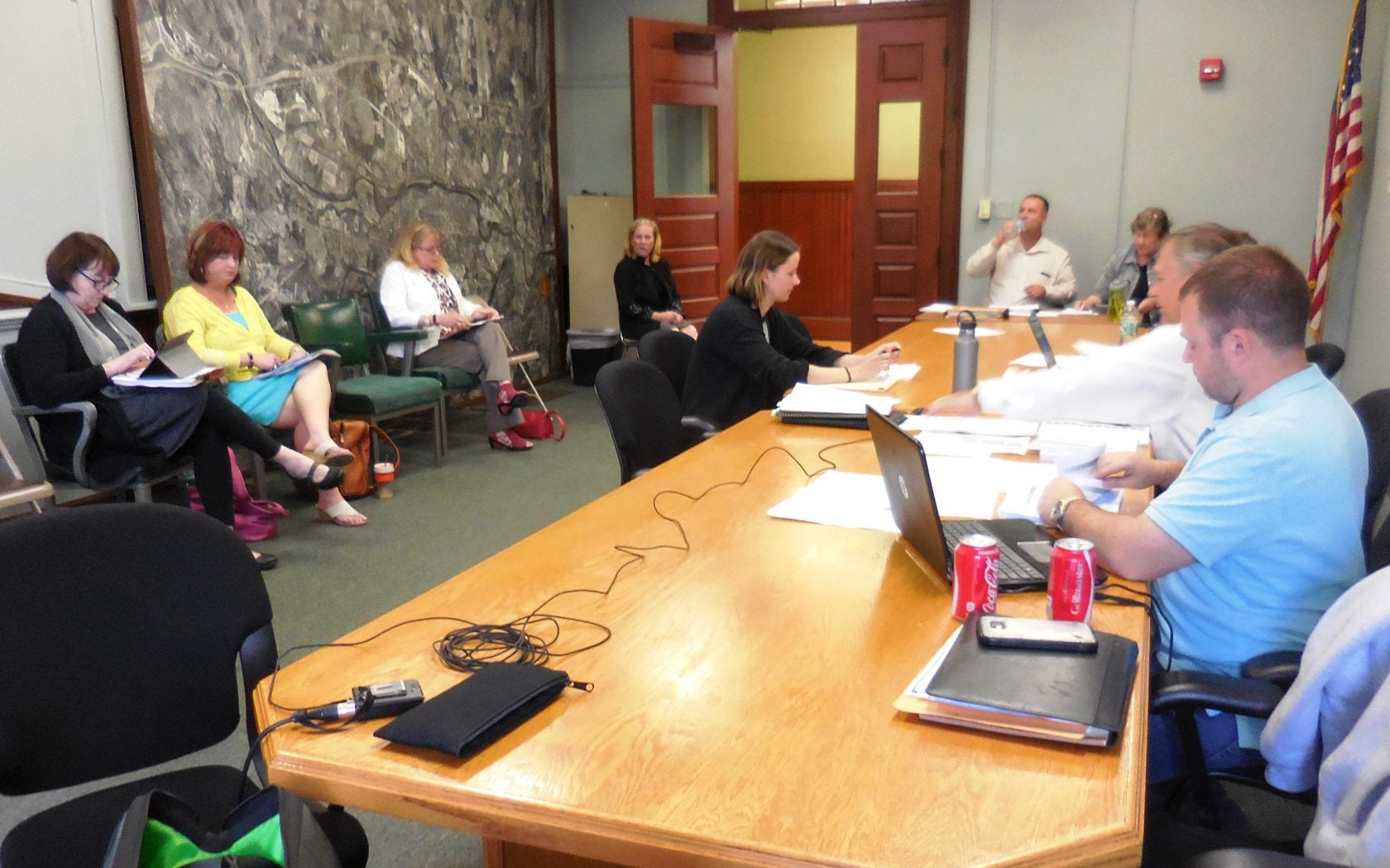
Finance sub-committee budget reviews began Tuesday in City Hall. (Photo by Amy Porter)
WESTFIELD – The Finance sub-committee, chaired by At-large Councilor Daniel Allie with Councilors Matthew Emmershy and Andrew K. Surprise began their marathon series of meetings with department heads on Tuesday evening. Councilors John J. Beltrandi, III, Mary Ann Babinski, Michael Burns, Ralph J. Figy, Dave Flaherty, Cindy C. Harris, William Onyski and Nicholas J. Morganelli, Jr. were also in attendance for all or a part of the three-hour meeting, which was originally scheduled for Room 208, but moved to Room 315 in order to accommodate everyone. In the process of changing rooms, the live stream was lost; however, the video recording of the meeting will air on Channel 15.
One by one, department heads came in and went through their budget sheets, answering questions along the way. Most questions were focused on revenue potential in the departments.
City Clerk Karen Fanion spoke about her recent purchase of four voting machines, which completes the purchases of new machines begun two years ago. $41,000 originally in the FY19 budget for the machines was taken out, when an opportunity to fund them came in the current fiscal year, and was approved by the City Council at the May 31 meeting.
For the City Clerk’s office, Fanion said she could raise the rates of certified copies from $10 to $12-$15, which she said could be justified by the increased cost of the security paper which is now required to be used.
Treasurer/Collector Meghan Kane said the majority of her budget is in personnel costs for service, reflected in the 2.5% increase for city employees, plus insurance matches. Flaherty said that in the detailed sheet, the increases including benefits totaled 5.24%. “When you hear about a 2.5% contract raise, that’s not really what it costs the city. It costs a lot more,” commented Flaherty.
Kane also went into current foreclosures in the city and associated costs. Allie asked her how the city is doing with collections of real estate tax. Kane said she is working with the Law Department to make payment agreements with residents in arrears. Kane also said the city will hold its first auction “in a while” in mid-July, adding that foreclosures take a long time in land court.
Allie asked if Kane had a schedule of all of the bond payments and when they would sunset. Kane said the bonds are listed in the Treasurer department on the city website under debts. Flaherty asked whether the Cross Street School bond could be closed, and Kane said she was waiting for the Massachusetts School Building Authority (MSBA) to review it and for all the receipts to be in before they close.
Flaherty also asked when the $5 and $13 million water bonds would be sold. Kane said the city could borrow short-term for one year and renew for a year before the bonds are sold. To Allie’s question of whether they would be combined, Kane said the authorization would be a total the city could borrow on. She said no bonds will be sold in FY19.

City Assessor Robin Johnson. (Photo by Amy Porter)
Allie asked City Assessor Robin Johnson if she had any idea of the values of properties and trends in the city. Johnson said residential values are going up, and she is considering raising the value on some of the single family homes and 3-4 family residences by 3%, but is waiting on new growth numbers.
Currently, Johnson said she expects total new growth in the city to be $1.3 million by the end of the fiscal year, with $600,000 on the commercial side. Johnson said there is more on the commercial side than residential because the tax rate is so different. She added that there are a couple of solar projects coming online that aren’t counted in that number.
Director of Purchasing Tammy Tefft said her goal is to save on purchases wherever possible “within the confines of the law.” Tefft said this year she sold off vehicles and other replaced equipment in the city through online auctions, making $74,000 in surplus sales. She said the majority of the money raised goes into the general fund, except for items sold from the Water and Sewer Department which goes back to them.
Tefft said she budgets $100,000 for repair and maintenance, and works closely with Director of Facilities Bryan Forrette on the best way to spend those funds. She said the last six years they were spent “fixing things that need to be fixed,” but this year they will be working more on preventative maintenance.
Another savings realized in purchasing was in car insurance. Tefft said for the last twelve years, the city did not insure the Police Department for comprehensive and collision insurance. This year they did, and saved $27,000 by getting the insurance company to pay for brand new cruisers due to several unfortunate accidents, which included a collision with a bear.
One increase in the purchasing budget is for an HVAC upgrade at the airport. Tefft said they are having serious problems with air conditioning and heating. She believes the HVAC units were not correctly sized for the building and the windows. She said she and Bryan Forrette are looking at the FY19 budget to fix the airport, at an estimated cost of $27,000.
Flaherty questioned the cost projected for utility lighting, and asked why, having switched to LED lighting that costs weren’t going down. “We’re using less, but the rates are going up,” Tefft said. She said on average this year, there was a 3% increase in costs. Tefft said the costs come in as a reduction in Westfield Gas & Electric’s In Lieu of Taxes (ILOT) payment.
Another increase will be due to the new charging stations going in the parking lot at City Hall for electric vehicles. Tefft said she is not anticipating a huge amount for the two stations, one of which will be used for the city’s new electric vehicle, purchased with Green Community grant funds.








